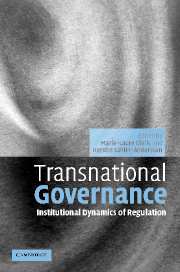Book contents
- Frontmatter
- Contents
- List of figures
- List of tables
- List of contributors
- Acknowledgments
- List of acronyms
- 1 Introduction: A world of governance: The rise of transnational regulation
- I Institutional forces
- II A dynamic transnational topography
- 7 Transnational actors, transnational institutions, transnational spaces: The role of law firms in the internationalization of competition regulation
- 8 Global enterprises in fields of governance
- 9 The transnational governance network of central bankers
- 10 Regulated regulators: Global trends of state transformation
- 11 The rationalization of universities
- III Transnational governance in the making
- References
- Index
11 - The rationalization of universities
Published online by Cambridge University Press: 22 September 2009
- Frontmatter
- Contents
- List of figures
- List of tables
- List of contributors
- Acknowledgments
- List of acronyms
- 1 Introduction: A world of governance: The rise of transnational regulation
- I Institutional forces
- II A dynamic transnational topography
- 7 Transnational actors, transnational institutions, transnational spaces: The role of law firms in the internationalization of competition regulation
- 8 Global enterprises in fields of governance
- 9 The transnational governance network of central bankers
- 10 Regulated regulators: Global trends of state transformation
- 11 The rationalization of universities
- III Transnational governance in the making
- References
- Index
Summary
Introduction
Universities are increasingly influenced by a common logic of mass higher education suggesting they become broadly inclusive, socially useful, and flexible organizations. For European universities this common logic is most clearly expressed in the Bologna Declaration and resonates with the European Union as a source of legitimate university identity. This logic emerged earlier in America, can be traced back to at least the late nineteenth century, and persists in the present. Not surprisingly a number of scholars comment on the Americanization of European universities (e.g. Rupp 1997). More indirectly the coming of the entrepreneurial (read American) university to Europe is hailed as salvation in some analyses (Clark 1993) and in others as tantamount to the university losing its soul (Readings 1996).
This chapter is agnostic on the deeply normative character of the debates on the future of the university. Its goals are as follows:
To demonstrate that universities are changing towards greater inclusiveness, usefulness, and flexibility.
To contend that these changes are driven not solely by rational adaptations to environmental changes but require and are propelled by general rationalizing accounts; and lastly
To suggest that these changes are further enhanced by the rationalization of universities as organizations and the corresponding decline of tradition and charisma as legitimating sources of university identity.
Throughout this chapter a core idea is that the logic of mass higher education is rooted in universalistic models of progress and justice that transcend the national ecologies of universities.
- Type
- Chapter
- Information
- Transnational GovernanceInstitutional Dynamics of Regulation, pp. 225 - 244Publisher: Cambridge University PressPrint publication year: 2006
- 54
- Cited by



